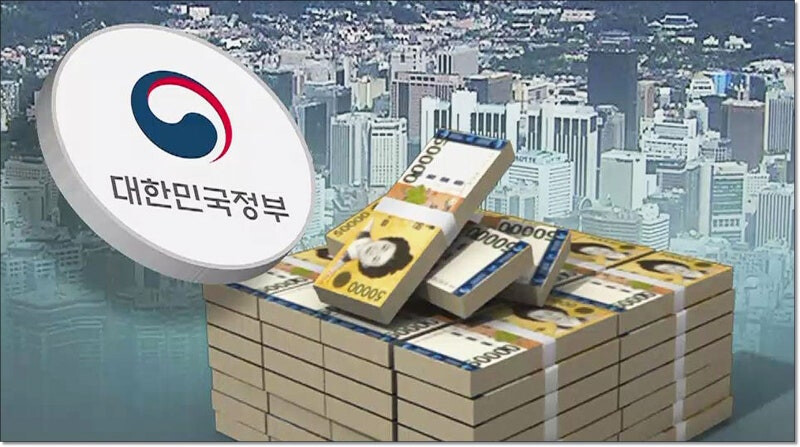
Seoul, South Korea – A confluence of factors, including robust fiscal spending in response to the COVID-19 pandemic, efforts to stimulate economic recovery, and increasing welfare expenditures, has propelled South Korea's national debt-to-GDP ratio to a critical juncture. The latest projections from the International Monetary Fund (IMF) reveal that South Korea's debt burden is set to exceed the average of advanced non-reserve currency nations for the first time in history, signaling potential challenges for the nation's fiscal stability and economic future.
The IMF's April 'Fiscal Monitor' report paints a concerning picture, forecasting South Korea's general government debt-to-GDP ratio to reach 54.5% in the current year. This surpasses the 54.3% average of the IMF's classification of 11 advanced non-reserve currency economies, a benchmark often used for international comparisons of fiscal health. General government debt provides a comprehensive view of a nation's liabilities, encompassing not only the direct debt of central and local governments but also the obligations of non-profit public institutions.
Furthermore, the IMF anticipates a continued upward trajectory in South Korea's debt ratio, projecting it to climb to 59.2% by 2030. This 4.7 percentage point increase over the next five years represents the second-largest expected rise among non-reserve currency advanced economies, trailing only the Czech Republic's projected 6.1 percentage point surge. By 2030, South Korea's debt-to-GDP ratio is expected to exceed the non-reserve currency average of 53.9% by a notable margin of over 5 percentage points.
While South Korea's projected debt levels remain considerably lower than those of major reserve currency nations within the G7 – such as the United States (128.2%), Japan (231.7%), and the United Kingdom (106.1%) by 2030 – direct comparisons are often deemed misleading. Reserve currency status affords these nations significant advantages in their ability to finance debt, including greater flexibility in monetary policy and lower borrowing costs due to the global demand for their currencies.
Non-reserve currency countries like South Korea, on the other hand, are inherently more vulnerable to fluctuations in global financial markets, shifts in foreign currency demand, and the risks of capital outflows. This heightened sensitivity underscores the critical importance of maintaining prudent fiscal management and a strong focus on fiscal sustainability for these economies. A higher debt burden can increase borrowing costs, limit the government's ability to respond to future economic shocks, and potentially erode investor confidence.
Adding to the fiscal concerns are the headwinds facing the South Korean economy. The Korea Development Institute (KDI) is expected to significantly downgrade its economic growth forecast for the first half of the year, a revision anticipated in its upcoming 'H1 Economic Outlook' scheduled for release on May 14th. This potential downward adjustment follows a previous reduction in February, when KDI lowered its annual growth projection from 2.0% to 1.6%. Persistent uncertainties surrounding US trade policies and a continued stagnation in domestic demand are now fueling expectations of a further cut, potentially pushing the growth forecast into the low 1% range.
South Korea's recent economic performance stands in stark contrast to many of its global peers. Sluggish recoveries in both consumer spending and construction investment have been compounded by domestic political uncertainties that emerged at the end of the previous year, further dampening consumer and business sentiment. Data from the Bank of Korea reveals that South Korea's real GDP contracted by 0.246% in the first quarter of this year (on a quarter-on-quarter basis), marking the lowest growth rate among the 19 countries for which comparable data is currently available. The United States also experienced negative growth (-0.069%) during the same period, but the contraction was significantly less severe than in South Korea.
This pattern of lackluster economic growth is not a recent phenomenon. South Korea's quarter-on-quarter GDP growth in the second quarter of 2024 was -0.228% (ranking 32nd among the reported nations), followed by a tepid 0.1% growth in the third quarter (ranking 26th), indicating a failure to achieve a robust rebound. The fourth quarter of 2024 saw growth remain anemic at 0.066% (ranking 29th), highlighting a persistent struggle to break free from near-zero growth.
The combination of a rising debt-to-GDP ratio, surpassing the average of its non-reserve currency peers, and a weakening economic growth outlook presents a complex challenge for South Korean policymakers. Addressing the growing national debt while simultaneously stimulating economic activity will require a delicate balancing act. Fiscal consolidation measures may be necessary to curb the rise in debt, but these could potentially dampen economic growth if implemented too aggressively. Conversely, continued fiscal expansion to boost the economy could further exacerbate the debt burden, raising concerns about long-term fiscal sustainability.
Analysts suggest that South Korea needs to focus on structural reforms aimed at boosting long-term growth potential, such as addressing labor market rigidities, fostering innovation, and enhancing productivity. Additionally, a carefully calibrated approach to fiscal policy, balancing the need for short-term economic support with the imperative of long-term fiscal prudence, will be crucial in navigating these economic and fiscal headwinds. The upcoming economic outlook from the KDI will be closely watched for insights into the projected trajectory of the South Korean economy and potential policy recommendations. The nation's ability to manage its rising debt while reigniting economic growth will be a key determinant of its future economic prosperity and stability in an increasingly uncertain global landscape.
[Copyright (c) Global Economic Times. All Rights Reserved.]






























